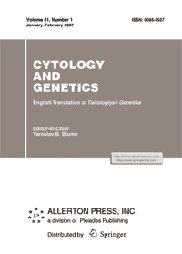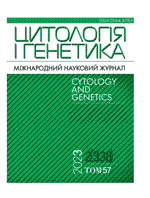РЕЗЮМЕ. Ген RAD51 кодує білки, які є важливими для репарації дволанцюгових розривів ДНК шляхом рекомбінації. Таким чином, генетична мінливість гену може сприяти виникненню і прогресуванню карциноми молочної залози. Нами було досліджено зв’язок між поліморфізмами в генах репарації ДНК RAD51 135G/C та ризиком виникнення раку молочної залози. Генотипи визначали у 55 жінок з раком молочної залози і 80 здорових осіб контрольної групи такого ж віку за допомогою ПЛРПДРФ. У всіх пацієнток та здорових осіб контрольної групи взяли зразки крові та виділили ДНК. Область дослідження ампліфікували за допомогою ПЛР. Після ампліфікації ми використали рестрикційний фермент (RAD51; MvaI) та обробили продукт ПЛР. Згодом ці фрагменти ДНК були розділені за розмірами під час електрофорезу у гелі. Нами були ідентифіковані зміни в нуклеотидах саме у цих областях і підтверджено генотипування шляхом сиквенування вибірки продуктів ПЛР з використанням Applied Biosystems Automated Sequencer. Було встановлено значні відмінності між групою пацієнток з раком молочної залози і здоровою контрольною групою і в частотах алелів, і частотах генотипів. Частота варіантного алеля, C, підвищилась до 0,25 у групі пацієнток з раком молочної залози порівняно з частотою 0,125 у контрольній групі. Також генотипи, що несуть варіантний алель C (CC+GC), мали підвищений рівень частоти і вище співвідношення шансів серед групи пацієнток з раком молочної залози. Отримані результати вказують на те, що поліморфізм генів RAD51 може бути пов’язаний з виникненням раку молочної залози у населення cхідного Середземномор’я. Ми висунули гіпотезу, що звичайні поліморфізми в генах репарації ДНК і генахрегуляторах клітинного циклу змінюють механізми репарації ДНК, що сприяє схильності до раку молочної залози.
Ключові слова: ген RAD51, поліморфізм, MvaI, рак молочної залози, східне Середземномор’я, турецьке населення

Повний текст та додаткові матеріали
Цитована література
1. Akisik, E., Yazici, H., and Dalay, N., ARLTS1, MDM2 and RAD51 gene variations are associated with familial breast cancer, Mol. Biol. Rep., 2011, vol. 38, pp. 343–348. https://doi.org/10.1007/s11033-010-0113-3
2. Antoniou, A.C., Sinilnikova, O.M., Simard, J., et al., RAD51 135G→C modifies breast cancer risk among BRCA2 mutation carriers: results from a combined analysis of 19 studies, Am. J. Hum. Genet., 2007, vol. 81, pp. 1186–1200. https://doi.org/10.1086/522611
3. Bennett, I.C., Gattas, M., and Teh, B.T., The genetic basis of breast cancer and its clinical implications, Aust. N. Z. J. Surg., 1999, vol. 69, pp. 95–105. https://doi.org/10.1046/j.1440-1622.1999.01515.x
4. Bray, F., Ferlay, J., Soerjomataram, I., et al., Global cancer statistics 2018: GLOBOCAN estimates of incidence and mortality worldwide for 36 cancers in 185 countries, CA Cancer J. Clin., 2018, vol. 68, pp. 394–424. https://doi.org/10.3322/caac.21492
5. Cetinkunar, S., Gok, I., Celep, R.B., et al., The effect of polymorphism in DNA repair genes RAD51 and XRCC2 in colorectal cancer in Turkish population, Int. J. Clin. Exp. Med., 2015, vol. 8, p. 2649.
6. Cheng, D., Shi, H., Zhang, K., et al., RAD 51 gene 135G/C polymorphism and the risk of four types of common cancers: a meta-analysis, Diagn. Pathol., 2014, vol. 9, p. 18.
7. Coskun, T., Kosova, F., Ari, Z., et al., Effect of oncological treatment on serum adipocytokine levels in patients with stage II-III breast cancer, Mol. Clin. Oncol., 2016, vol. 4, pp. 893–889. https://doi.org/10.3892/mco.2016.8157
8. Debies, M.T. and Welch, D.R., Genetic basis of human breast cancer metastasis, J. Mammary Gland Biol. Neoplasia, 2001, vol. 6, pp. 441–451.
9. Galkin, V.E., Esashi, F., Yu, X., et al., BRCA2 BRC motifs bind RAD51–DNA filaments, Proc. Natl. Acad. Sci. U. S. A., 2005, vol. 102, pp. 8537–8542. https://doi.org/10.1073/pnas.0407266102
10. Gao, L.-B., Pan, X.-M., Li, L.-J., et al., RAD51 135G/C polymorphism and breast cancer risk: a meta-analysis from 21 studies, Breast Cancer Res. Treat., 2011, vol. 125, pp. 827–835.
11. Gok, I. and Ozden, O., Examination of RAD51 gene G135C polymorphism in gastric cancer patients in northeastern Anatolia, Arch. Biol. Sci., 2019, vol. 71, pp. 209–213. https://doi.org/10.2298/ABS181121002G
12. Gok, I., Ucar, F., Ozgur, O., et al., CARD15 gene 3020insC mutation with inflammatory bowel diseases patients in the black sea region of Turkey, Maced. J. Med. Sci., 2014, vol. 7, pp. 215–218. https://doi.org/10.3889/mjms.1857-5773.2014.0406
13. Gonzalez, R., Silva, J.M., Dominguez, G., et al., Detection of loss of heterozygosity at RAD51, RAD52, RAD54 and BRCA1 and BRCA2 loci in breast cancer: pathological correlations, Br. J. Cancer, 1999, vol. 81, p. 503.
14. Gültekin, M. and Boztaş, G., TüRkiye Kanser Istatistikleri, Sağlık Bakanl Türkiye Halk Sağlığı Kurumu, 2014, 43 p.
15. Krupa, R., Sliwinski, T., Wisniewska-Jarosinska, M., et al., Polymorphisms in RAD51, XRCC2 and XRCC3 genes of the homologous recombination repair in colorectal cancer—a case control study, Mol. Biol. Rep., 2011, vol. 38, pp. 2849–2854. https://doi.org/10.1007/s11033-010-0430-6
16. Nissar, S., Baba, S.M., Akhtar, T., et al., RAD51 G135C gene polymorphism and risk of colorectal cancer in Kashmir, Eur. J. Cancer Prev., 2014, vol. 23, pp. 264–268. https://doi.org/10.1097/CEJ.0000000000000049
17. Pharoah, P.D., Dunning, A.M., Ponder, B.A., et al., Association studies for finding cancer- susceptibility genetic variants, Nat. Rev. Cancer, 2004, vol. 4, p. 850.
18. Richardson, C., RAD51, genomic stability, and tumorigenesis, Cancer Lett., 2005, vol. 218, pp. 127–213.https://doi.org/10.1016/j.canlet.2004.08.0099
19. Romanowicz-Makowska, H., Samulak, D., Michalska, M., et al., RAD51 gene polymorphisms and sporadic colorectal cancer risk in Poland, Pol. J. Pathol., 2012, vol. 63, pp. 193–198. https://doi.org/10.5114/PJP.2012.31505
20. Shimizu, H., Ross, R.K., Bernstein, L., et al., Cancers of the prostate and breast among Japanese and white immigrants in Los Angeles County, Br. J. Cancer, 1991, vol. 63, p. 963. https://doi.org/10.1038/bjc.1991.210
21. Smith, C.A.B., Measures of homozygosity and inbreeding in populations, Ann. Hum. Genet., 1974, vol. 37, pp. 377–391. https://doi.org/10.1111/j.1469-1809.1974.tb01844.x
22. Society AC, Breast Cancer Facts and Figures 2017–2018, American Cancer Society Atlanta, GA, 2017.
23. Stratton, M.R. and Rahman, N., The emerging landscape of breast cancer susceptibility, Nat. Genet., 2008, vol. 40, p. 17.https://doi.org/10.1038/ng.2007.53
24. Wang, W.W., Spurdle, A.B., Kolachana, P., et al., A single nucleotide polymorphism in the 5′ untranslated region of RAD51 and risk of cancer among BRCA1/2 mutation carriers, Cancer Epidemiol. Prev. Biomark., 2001, vol. 10, pp. 955–960.
25. Wick, W., Petersen, I., Schmutzler, R.K., et al., Evidence for a novel tumor suppressor gene on chromosome 15 associated with progression to a metastatic stage in breast cancer, Oncogene, 1996, vol. 12, pp. 973–978.
26. Wu, S., Powers, S., Zhu, W., et al., Substantial contribution of extrinsic risk factors to cancer development, Nature, 2016, vol. 529, p. 43.
27. Yoshikawa, K., Ogawa, T., Baer, R., et al., Abnormal expression of BRCA1 and BRCA1-interactive DNA-repair proteins in breast carcinomas, Int. J. Cancer, 2000, vol. 88, pp. 28–36. https://doi.org/10.1002/1097-0215(20001001)88:1<28::AID-IJC5>3.0.CO;2-4
28. Zabaleta, J., Schneider, B.G., Ryckman, K., et al., Ethnic differences in cytokine gene polymorphisms: potential implications for cancer development, Cancer Immunol. Immunother., 2008, vol. 57, pp. 107–114. https://doi.org/10.1007/s00262-007-0358-4
29. Zhou, G.-W., Hu, J., Peng, X.-D., et al., RAD51 135G>C polymorphism and breast cancer risk: a meta-analysis, Breast Cancer Res. Treat., 2011, vol. 125, pp. 529–535. https://doi.org/10.1007/s10549-010-1031-8
